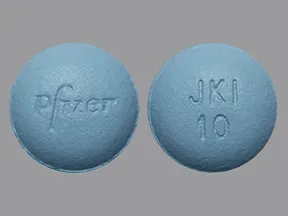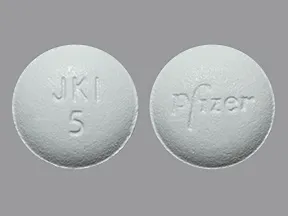Do not share this medication with others.
Lab and/or medical tests (such as liver/kidney function, complete blood count, cholesterol levels, skin exams) should be done while you are using this medication. Keep all medical and lab appointments.
Tofacitinib is used to treat certain types of arthritis (such as psoriatic arthritis, rheumatoid arthritis, ankylosing spondylitis, polyarticular course juvenile idiopathic arthritis-pcJIA). It helps to decrease pain/tenderness/swelling in the joints. Tofacitinib is also used to treat a certain bowel disease (ulcerative colitis). It helps to reduce symptoms of ulcerative colitis such as diarrhea, rectal bleeding, and stomach pain.
Tofacitinib may lower your ability to fight infections. This may make you more likely to get a serious (rarely fatal) infection or make any infection you have worse. The most common serious infections include pneumonia, skin infections, shingles, a certain bowel disease (diverticulitis), swelling of the appendix (appendicitis), and urinary tract infections. The risk for infections may be higher if you also take other drugs that suppress the immune system (such as cyclosporine, tacrolimus). Tell your doctor right away if you have any signs of infection (such as a sore throat that doesn't go away, fever, chills, cough, trouble breathing, painful/frequent urination, non-healing skin sores).
You should have a tuberculosis (TB) skin test before and during treatment with this medication. Tell your doctor if you have been near someone with tuberculosis or have lived or traveled in areas where certain fungal infections (such as coccidioidomycosis, histoplasmosis) are common. These areas include the Ohio and Mississippi River valleys and the southwestern United States.
Though it is very unlikely to occur, there may be a risk of developing cancer (such as lymphoma, skin cancer, lung cancer) with this medication. Your risk may be higher if you are a current or past smoker. Tell your doctor right away if you develop symptoms such as fever or cough that doesn't go away, wheezing, unusual lumps/growths, unexplained weight loss, night sweats, change in appearance or size of moles, or unusual skin changes.
Tofacitinib may cause serious (possibly fatal) blood clots in the lungs or legs, or clots that cause a stroke or heart attack. You may be at an increased risk for blood clots if you are a current or past smoker, or are 50 years of age or older and have at least one risk factor for heart disease. Discuss the risks and benefits of treatment with your doctor. Get medical help right away if you have symptoms of blood clots, such as shortness of breath/rapid breathing, chest/jaw/left arm pain, unusual sweating, confusion, sudden dizziness/fainting, pain/swelling/warmth in the groin/calf, sudden/severe headaches, trouble speaking, weakness on one side of the body, or sudden vision changes.
In patients with a kidney transplant who are also taking other drugs that suppress the immune system, there may also be a risk of developing a certain white blood cell disorder (Epstein Barr Virus-associated post-transplant lymphoproliferative disorder) with this medication. Discuss the risks and benefits of treatment with your doctor.
Read the Medication Guide provided by your pharmacist before you start taking tofacitinib and each time you get a refill. If you are using the liquid form of this medication, also read the Instructions for Use. If you have any questions, ask your doctor or pharmacist.
Take this medication by mouth with or without food as directed by your doctor, usually once or twice daily.
If you are using the liquid form of this medication, carefully measure the dose using a special measuring device/spoon. Do not use a household spoon because you may not get the correct dose.
The dosage is based on your medical condition, response to treatment, lab tests, and other medications you may be taking. Be sure to tell your doctor and pharmacist about all the products you use (including prescription drugs, nonprescription drugs, and herbal products). Children's dosage is also based on weight. Do not increase your dose or use this drug more often or for longer than prescribed. Your condition will not improve any faster, and your risk of serious side effects will increase.
Take this medication regularly to get the most benefit from it. Remember to take it at the same time(s) each day.
Tell your doctor if your condition does not get better or if it gets worse.
See also Warning section.
Headache or diarrhea may occur. If either of these effects lasts or gets worse, tell your doctor or pharmacist promptly.
People using this medication may have serious side effects. However, you have been prescribed this drug because your doctor has judged that the benefit to you is greater than the risk of side effects. Careful monitoring by your doctor may decrease your risk.
Tell your doctor right away if you have any serious side effects, including: unusual tiredness, fast heartbeat, signs of liver disease (such as nausea/vomiting that doesn't stop, loss of appetite, stomach/abdominal pain, yellowing eyes/skin, dark urine).
A very serious allergic reaction to this drug is rare. However, get medical help right away if you notice any symptoms of a serious allergic reaction, including: rash, itching/swelling (especially of the face/tongue/throat), severe dizziness, trouble breathing.
This is not a complete list of possible side effects. If you notice other effects not listed above, contact your doctor or pharmacist.
In the US - Call your doctor for medical advice about side effects. You may report side effects to FDA at 1-800-FDA-1088 or at www.fda.gov/medwatch.
In Canada - Call your doctor for medical advice about side effects. You may report side effects to Health Canada at 1-866-234-2345.
See also Warning section.
Before taking tofacitinib, tell your doctor or pharmacist if you are allergic to it; or if you have any other allergies. This product may contain inactive ingredients, which can cause allergic reactions or other problems. Talk to your pharmacist for more details.
Before using this medication, tell your doctor or pharmacist your medical history, especially of: blood clots (such as in the lungs, legs), blood/bone marrow disorders (such as anemia, low lymphocyte/neutrophil count), cancer, heart problems (such as previous heart attack), kidney disease, liver disease (such as hepatitis B or C), lung disease, past/recent/current infections (such as tuberculosis, herpes zoster, HIV infection), current or past smoking, other stomach/intestinal disorders (such as ulcers, diverticulitis), stroke.
Tofacitinib can make you more likely to get infections or may make current infections worse. Stay away from anyone who has an infection that may easily spread (such as chickenpox, COVID-19, measles, flu). Talk to your doctor if you have been exposed to an infection or for more details.
Tell your health care professional that you are using tofacitinib before having any immunizations/vaccinations. Avoid contact with people who have recently received live vaccines (such as flu vaccine inhaled through the nose).
Liquid products may contain sugar and/or aspartame. Liquid products may also contain alcohol. Caution is advised if you have diabetes, liver disease, phenylketonuria (PKU), or any other condition that requires you to limit/avoid these substances in your diet. Ask your doctor or pharmacist about using this product safely.
Before having surgery, tell your doctor or dentist about all the products you use (including prescription drugs, nonprescription drugs, and herbal products).
Older adults may be at greater risk for infections while using this drug.
During pregnancy, this medication should be used only when clearly needed. Discuss the risks and benefits with your doctor. Tell your doctor if you are planning pregnancy or become pregnant.
It is unknown if this medication passes into breast milk. Because of the possible risk to the infant, breastfeeding is not recommended while using this medication and for at least 18 hours after the last dose. Consult your doctor before breastfeeding.
See also Warning section.
Drug interactions may change how your medications work or increase your risk for serious side effects. This document does not contain all possible drug interactions. Keep a list of all the products you use (including prescription/nonprescription drugs and herbal products) and share it with your doctor and pharmacist. Do not start, stop, or change the dosage of any medicines without your doctor's approval.
Other medications can affect the removal of tofacitinib from your body, which may affect how tofacitinib works. Examples include rifampin, among others.
If someone has overdosed and has serious symptoms such as passing out or trouble breathing, call 911. Otherwise, call a poison control center right away. US residents can call 1-800-222-1222. Canada residents can call 1-844-764-7669.
Do not share this medication with others.
Lab and/or medical tests (such as liver/kidney function, complete blood count, cholesterol levels, skin exams) should be done while you are using this medication. Keep all medical and lab appointments.
If you miss a dose, take it as soon as you remember. If it is near the time of the next dose, skip the missed dose. Take your next dose at the regular time. Do not double the dose to catch up.
Store at room temperature away from light and moisture. Do not store in the bathroom. Keep all medications away from children and pets.
Store the liquid form in the original bottle with the cap tightly closed. After each use, place the bottle back into the carton to protect from light. After opening, discard any remaining liquid medication after 60 days.
Do not flush medications down the toilet or pour them into a drain unless instructed to do so. Properly discard this product when it is expired or no longer needed. Consult your pharmacist or local waste disposal company.

Xeljanz 10 mg tablet
Color: blueShape: roundImprint: Pfizer JKI 10This medicine is a blue, round, film-coated, tablet imprinted with "Pfizer" and "JKI 10".

Xeljanz 5 mg tablet
Color: whiteShape: roundImprint: Pfizer JKI 5This medicine is a blue, round, film-coated, tablet imprinted with "Pfizer" and "JKI 10".